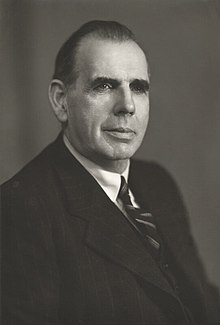- 1 2 3 4 5 6 7 8 9 10 11 12 13 14 "MACDONALD OF GWAENYSGOR, 1st Baron". Who Was Who . Oxford University Press. December 2007. Retrieved 20 November 2011.
- 1 2 3 "Macdonald, Sir Gordon (1885-1966)". Profiles of Governors. Newfoundland and Labrador Heritage Web Site Project. August 2000. Retrieved 20 November 2011.
- ↑ "Index entry". FreeBMD. ONS. Retrieved 18 December 2020.
- 1 2 3 4 5 6 7 8 9 10 11 12 13 14 "Obituary: Ld. Macdonald of Gwaenysgor". The Times . 21 January 1966. p. 14.
- ↑ "No. 38587". The London Gazette . 15 April 1949. p. 1891.
External links
- Hansard 1803–2005: contributions in Parliament by Mr Gordon Macdonald (later 1st Baron Macdonald of Gwaensygor)
- Lord MacDonald of Gwaenysgor on the Dictionary of Welsh Biography
- Brief description or Lord MacDonald's papers at the National Library of Wales
The Lord Macdonald of Gwaenysgor | |
|---|---|
 Macdonald in 1948 | |
| 68th Governor of Newfoundland | |
| In office 1946–1949 |
